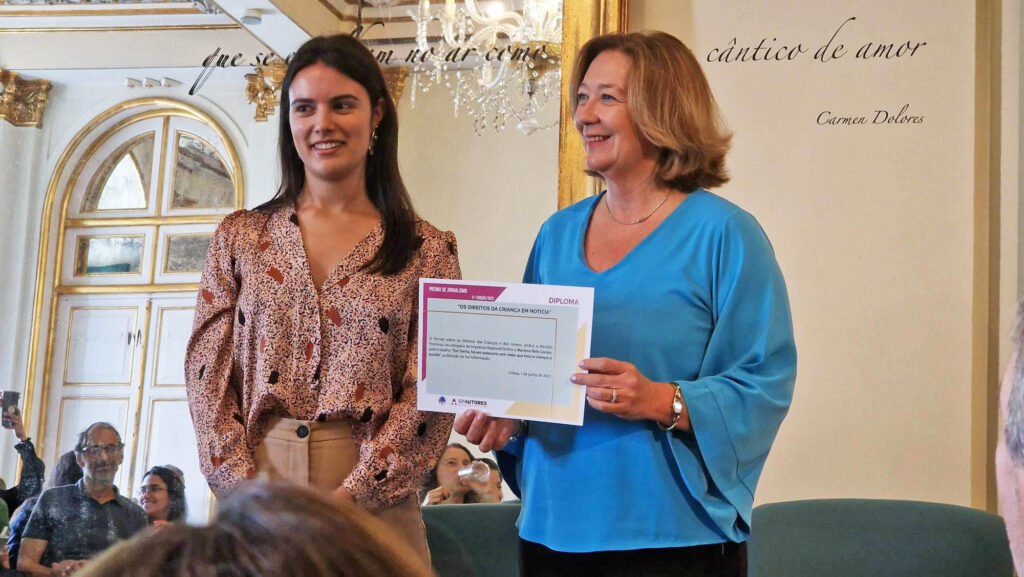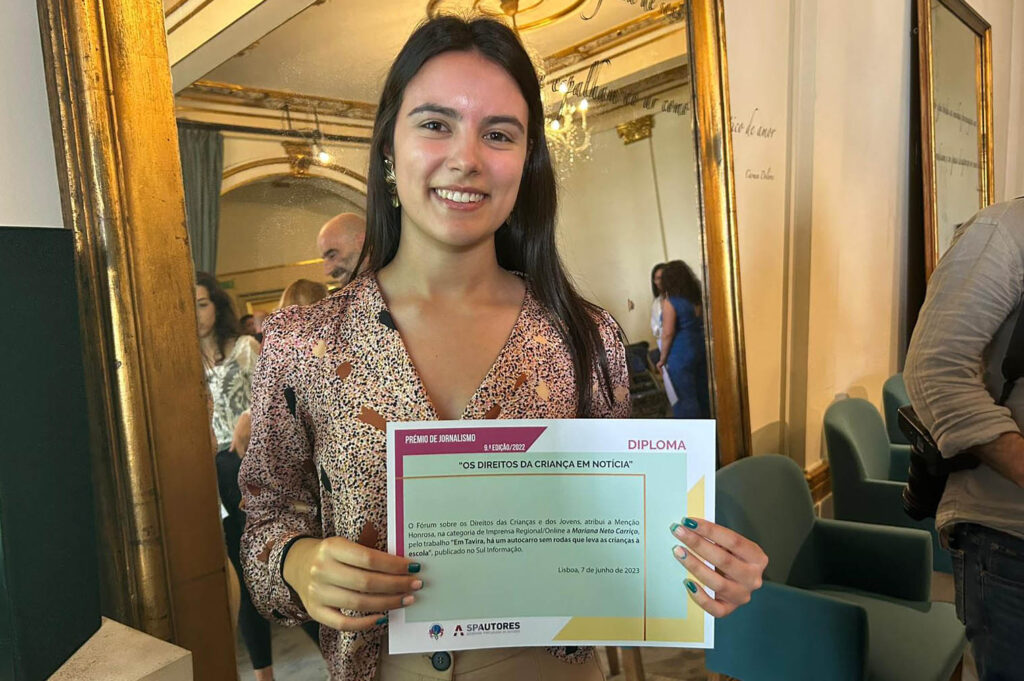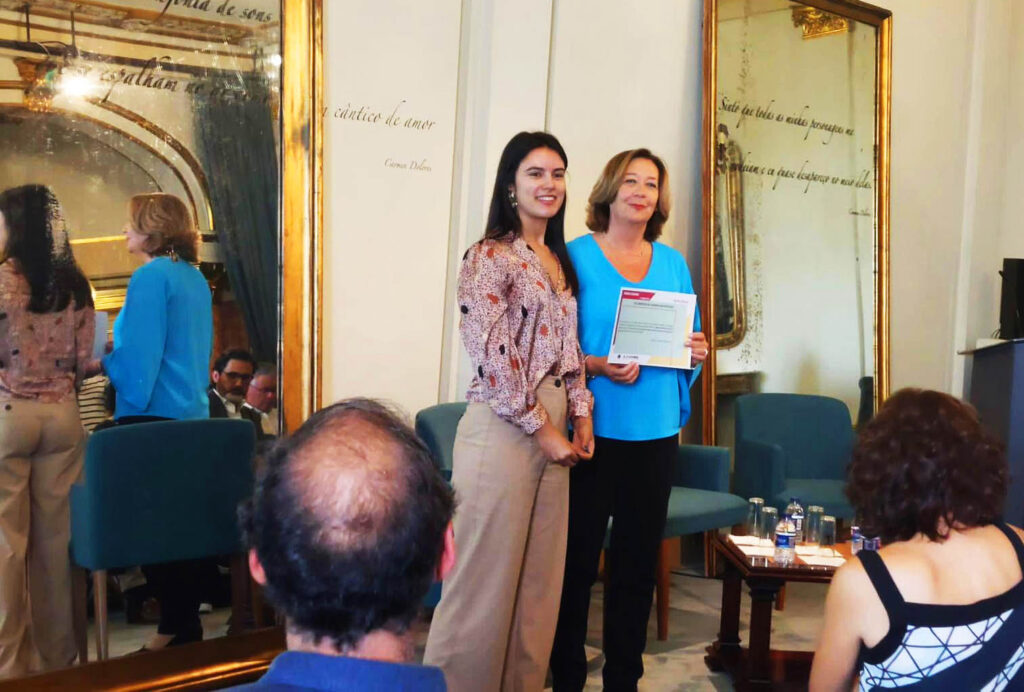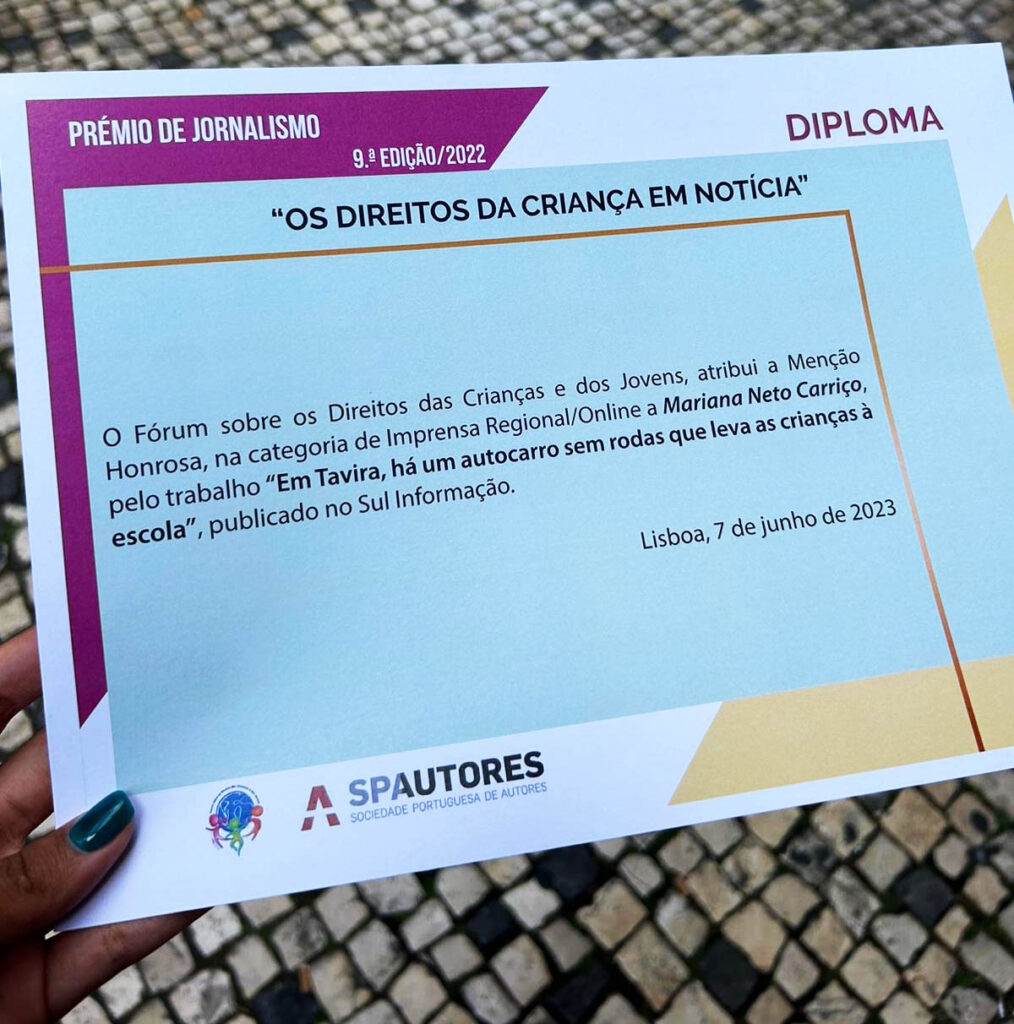Mariana Carriço, the youngest member of the Sul Informação, was awarded this afternoon at the awarding of the Journalism Prize “Children's Rights in the News”, which took place in the main hall of Teatro da Trindade, in Lisbon.
Mariana Carriço won an Honorable Mention in the Regional/Online Press category, for his report «In Tavira, there is a bus without wheels that takes children to school», published here.
The “Children's Rights in the News” Journalism Award is promoted annually by the Forum on the Rights of Children and Young People, sponsored by the Portuguese Society of Authors.
This annual distinction aims to value reference journalistic work, bearing in mind the rights established by the Convention on the Rights of the Child, as well as the legal, ethical and deontological principles relating to the way in which topics about children and young people are disclosed.
The members of the jury that evaluates and selects the works are Ioli Campos, professor at the Universidade Católica Portuguesa and Universidade Nova de Lisboa, partner of the Forum on the Rights of the Child, Manuel Pinto, professor at the University of Minho, and Lídia Maropo, professor at the Polytechnic Institute of Setúbal (partner of the Forum on Children's Rights) and researcher at CICS.NOVA.
According to José Jorge Letria, president of the Portuguese Society of Authors, “support for this award helps to stimulate the work of journalists and their freedom to write and observe reality. Journalists are also authors and therefore this support is strong and committed”.
In turn, the members of the jury highlight the quality of the pieces in competition, the great diversity of themes and the in-depth way in which they were made, fulfilling and ensuring the demands and requirements of the prize.
Complete list of prizes:
Television Category:
Journalists Filipe Pinto, from RTP and Catarina Marques, from SIC, won, ex aequo, the first
place.
Catarina Marques, SIC – Tears are not heard
According to jury members, “The concept of bullying is not new to anyone, but if the problem persists, you need to keep talking about it. This report does so in a very sober and complete manner. (…) It contributes to a better understanding of the complexity of the problem, identifying multiple factors, without sensationalism. It prominently presents the perspective of adolescents on the problem”.
Filipe Pinto, RTP – The dream ends at 15
According to the jury, “this is a very well developed report from a journalistic point of view and exposes a shocking breach of children's rights: Portuguese law does not allow the adoption of institutionalized children over 15 years old, even if there is a desire to do so. of all those involved: adopting family, child and institution. Brothers end up being separated because of the law and cease to be brothers in the eyes of the law. The piece draws attention to the best interest of the child and promotes the visibility of a problem that is still little debated.”
Note: Already after the transmission of this report, the law was changed.
Radio Category
The radio prize was also awarded ex aequo to two journalists from Grupo RTP: Celina Faria from Antena 1 and Isabel Meira, from Antena 2.
Isabel Meira, RTP/Antena 2 – hunger every day
The jury considered that it is “a remarkable radio journalistic work, in terms of narrative construction, quality of voices, sounds and editing, around a major social and political problem: hunger in Brazil. It presents a wealth of points of view (homeless people, activists, researchers, church and government) and a public-political framework on a problem that affects millions of Brazilian children”.
Celina Faria, RTP/Antena 1 – the color of the kiss
In the global evaluation, the jury states that it is “A well-made report that tells us the story of the reception of Ukrainian refugees in Portugal, with special focus on the inclusion of children in school. It presents contextual data on the problem, listens to numerous sources (four teachers, three adults and two refugee children/adolescents, as well as a representative of the Association of Ukrainians in Madeira). It presents an in-depth overview of the challenges and efforts towards integration”.
National/Online Press Category
In this category, the jury awarded first place, also ex aequo, to journalists Patrícia Carvalho, from the newspaper Público, and Joana Ascensão, from Expresso.
Patricia Carvalho, Public – They always act like they are doing us a favor. And that's the worst.
“Although the Constitution of the Portuguese Republic guarantees that all children have “the right to protection by society and the State, with a view to their integral development, especially against all forms of abandonment, discrimination and oppression and against the abusive exercise of authority in the family and in other institutions”, this report reveals in depth the difficulties faced by children with special educational needs in accessing ATL and other extracurricular activities”. These are the main reasons why the jury distinguished this work.
Joana Ascensão, Expresso – Only Children on Earth
With regard to this work on desertification, the jury highlights the fact that it is “A problem that has often been represented by the media, generally from the point of view of the isolation of the elderly in the villages, but that this report shows what the experience of growing up in a of these villages, what it's like to play where there are no more children. It presents a wealth of contextual data, rich graphics, case reports and listens to diverse sources, including experts on demography and childhood, families and young people.”
Regional/online press
This was the first year that the regional press was awarded first place.
From the newspaper “Diário do Alentejo” received the prize, ex aequo, Nélia do Carmo Pedrosa and Marco Monteiro Cândido.
Nélia do Carmo Pedrosa, Diário do Alentejo – Bilingual – Reference School for Bilingual Education in the District of Beja accompanies eight students with various degrees of deafness.
The jury awarded this report that “Describes what teaching is like at the only reference school for the bilingual education of deaf students in the district of Beja, a work that reveals how access to bilingual education can be important in the socio-professional insertion of those with hearing impairments . The text is very well constructed, has several sources (young people, parents, teachers and the person responsible for bilingual education in Beja), clarifies legal aspects of the issue and discusses public policies in the area, contributing to the social inclusion of these children.”
Marco Monteiro Cândido, Diário do Alentejo – When the difference is not being different.
In this case, the jury valued the “Local work on the lives of children with asperger syndrome, an autistic spectrum disorder. The journalist incorporates the points of view of young people with autism, their families and a psychiatrist and explains in great detail the characteristics of the syndrome. A vibrantly told story that helps demystify stereotypes about growing up with autism.”
Honorable Mentions:
Television Category:
Miriam Alves, from SIC, with the report The guaranteed minimum?
Carla Adão, from RTP, with the work Steps of Courage.
Radio Category:
Daniela Espírito Santo, from Rádio Renascença, with the piece Behind the scenes of TikTok.
National/Online Press Category:
Inês Chaíça, from Jornal Público, with Kids are not well: the impact of the pandemic on the mental health of young people.
Inês Vanessa Pinto Pereira and Inês de Araújo e Silva, from JPN-Jornalismo PortoNet, with the work In the country of non-children.
Regional/online press
Mariana Neto Carriço, from the newspaper Sul Informação with In Tavira, there is a wheelless bus that takes children to school.






















Comments